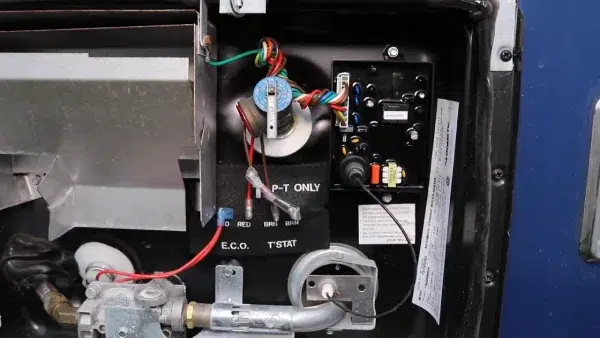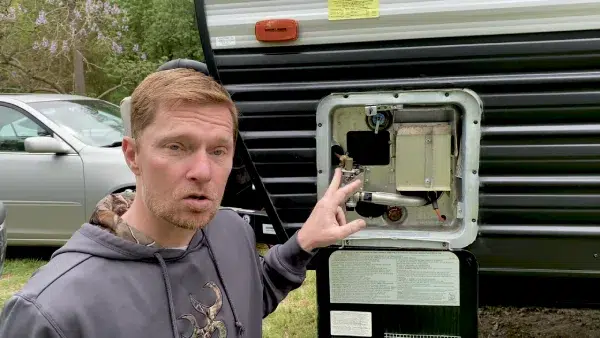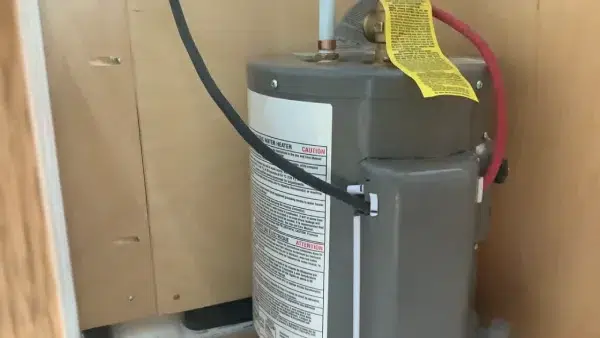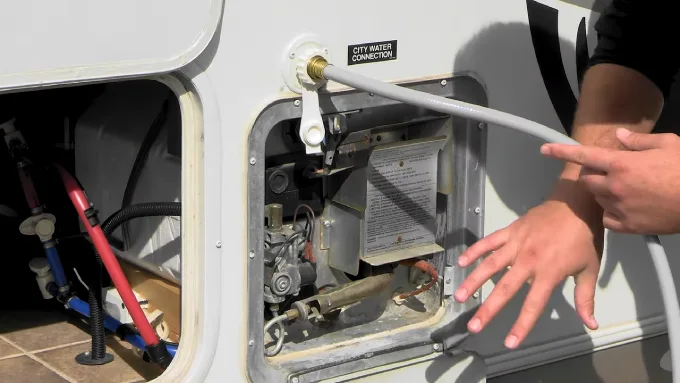Last Updated on June 20, 2023
As an avid traveler or even a full-time RVer, access to hot water is a must-have luxury. You can never underestimate the importance of having a hot shower or cleaning utensils using hot water when camping in your RV.
One of the most common questions that RVers ask is whether their RV water heaters run on battery. It is possible but requires more detailed steps than flipping a switch.
Tap into the power of your RV’s water heating system with this comprehensive blog post. Discover how these systems work and learn helpful tips to ensure energy-efficient operations.
Does the RV Water Heater Run on Battery: Powering

RV water heaters are essential to any camping trip, especially during cold weather. They provide hot water for showers, washing dishes, and cooking. However, powering an RV water heater can be a bit tricky. There are different ways to power an RV water heater, including propane, AC power, and DC power.
Propane-Powered RV Water Heater
A propane-powered RV water heater is one of the most common types of water heaters used in recreational vehicles. It uses propane gas to heat up the water, making it a reliable and efficient option for those who love to travel and camp in their RVs.
Propane-powered RV water heaters come in different sizes and capacities, depending on the size of your RV and your hot water needs. They are typically installed either inside or outside the vehicle, with an exhaust vent that releases any harmful gases produced during operation.
AC-Powered RV Water Heater
An RV water heater powered by AC is one of the most common RV water heaters available. As the name suggests, it runs on alternating current (AC) power, which means it requires a reliable source of electricity to function properly.
One advantage of an AC-powered RV water heater is that it can heat up water quickly and efficiently. This type of water heater typically has a heating element that heats up the water as it flows through the system. The process is fast and convenient, making it ideal for those who want hot water on demand.
However, the downside to using an AC water heater in an RV is that it requires a constant source of electricity to work. If you are camping in a remote area without access to electrical hookups or a power outage, your AC-powered RV water heater will not work.
DC-Powered RV Water Heater
A DC-powered RV water heater is a type of RV water heater that uses direct current (DC) to heat water. The RV’s battery typically powers this type of water heater and can be a great option for those who want to conserve propane or electricity.
Unlike propane-powered and AC-powered RV water heaters, DC-powered ones do not require a separate fuel source or electrical hookup. Instead, they rely on the RV’s battery to provide power. This makes them ideal for boondocking or dry camping, where access to electricity may be limited.
One advantage of using a DC-powered RV water heater is that it can be more energy-efficient than other water heaters. Because it does not rely on propane or AC power, it can help conserve these resources and extend the life of your battery.
However, it is important to note that DC-powered RV water heaters may take longer to heat up than other types of water heaters. This is because they rely solely on the battery for power and may have lower wattage than AC-powered models.
Does an RV Water Heater Run on Battery: An Explanation in Detail
An RV water heater is essential in any recreational vehicle, providing hot water for your shower, washing dishes, and other activities. But have you ever wondered if an RV water heater runs on battery? While this is certainly possible, some elements need further consideration before making a final decision.
The Role of Battery in an RV Water Heating System
The battery in an RV water heating system plays a crucial role in providing power to the ignition system and control circuitry. The battery is responsible for powering the spark or glow plug that ignites the propane or gas, which heats the water. Without a functioning battery, an RV water heater cannot operate.
It’s important to note that while the battery is essential for starting the ignition process, it does not provide continuous power to keep the water hot. Once the water has been heated to the desired temperature, it will maintain its heat without any additional power from the battery.
The size and capacity of your RV’s battery will determine how long your RV water heater can run on battery power alone. A standard 12-volt deep cycle marine/RV battery can typically provide enough power to run an RV water heater for several hours.
However, it’s important to remember that using a battery-powered RV water heater alone will drain your battery quickly. You should use this method temporarily when you cannot connect to shore power or propane.
How Long Can an RV Water Heater Run on Battery?
Since an RV water heater doesn’t run solely on battery power, it’s difficult to determine how long it can run on battery alone. However, suppose you’re using propane to heat your water and have a fully charged battery.
In that case, you should be able to use the electronic ignition system for several days before recharging the battery.
It’s important to note that running your RV water heater on propane will drain your battery faster than running it on AC power since the electronic ignition system draws power from the battery.
If you plan on using your RV water heater frequently during dry or off-grid camping, it’s important to have a backup power source, such as solar panels or a generator.
Preparing the Battery for the RV Water Heater
To run your RV water heater on battery, it is important to prepare the battery properly. This will ensure that you have enough power to run the water heater efficiently and effectively.
Battery Type Selection
There are two main types of batteries that you can use for your RV water heater: deep cycle batteries and regular car batteries. Regular car batteries are not recommended because they are designed to provide short bursts of high energy.
In contrast, deep-cycle batteries are designed to supply steady power over an extended period.
Deep cycle batteries come in different sizes and capacities, so you need to choose one that matches the power requirements of your RV water heater.
The capacity of a battery is measured in amp-hours (Ah), which indicates how much current the battery can provide over time. A battery with a high Ah rating will last longer.
When choosing a battery, you also need to consider its voltage level. Most RV water heaters operate on a 12V DC system, so you must choose a battery with a voltage rating of 12 volts or higher. If you choose a battery with a lower voltage rating, it may not be able to provide enough power to run your RV water heater.
It’s also essential to consider the type of chemistry used in the battery. Three main types are lead-acid, lithium-ion, and AGM (Absorbent Glass Mat). Lead-acid batteries are affordable but require regular maintenance and have shorter lifespans than lithium-ion and AGM batteries.
Lithium-ion batteries are more expensive but offer longer lifespans and faster charging times than lead-acid batteries. AGM batteries are maintenance-free and perform better in cold temperatures than lead-acid batteries.
Checking the Battery’s Voltage Level
Before you can run your RV water heater on battery power, ensuring your battery has enough voltage to handle the task is crucial. The voltage level of your battery will determine how long it can power your water heater.
You’ll need a multimeter to check your battery’s voltage level. Measurements of voltage, current, and resistance are made with a multimeter. You can purchase one at any hardware or electronics store.
To check the voltage level of your battery using a multimeter, follow these steps:
- Turn off all electrical appliances in your RV, including the water heater.
- Locate the battery compartment in your RV and remove the cover.
- Set your multimeter to measure DC voltage and connect the probes to the positive and negative terminals of the battery.
- Check the reading on your multimeter display. A fully charged 12-volt battery should read between 12.6 and 12.8 volts.
If your battery’s voltage level is below 12 volts, it may not have enough power to run your water heater for an extended period. In this case, you should consider charging or replacing the battery before attempting to run your water heater on battery power.
Regularly monitoring your battery’s voltage level when using a battery-powered RV water heater is essential. As you use hot water, the battery will drain its power faster than usual, so keeping an eye on its voltage level will help you avoid running out of power unexpectedly.
Steps to Run Your RV Water Heater on Battery

Follow a few simple steps to operate your RV water heater from a battery. Here’s what you need to do:
Step 1: Turn Off the Propane and Electric Supply to the Water Heater
To run your RV water heater on battery, the first step is to switch off the electric and propane supply. This is important because you don’t want any power source interfering with the battery supply.
To turn off the propane supply, locate the propane valve near your RV’s water heater and turn it off. You can also turn off the electric supply by locating the circuit breaker that controls power to the water heater and turning it off.
Step 2: Hook Up a 12V DC Power Source to the RV Water Heater
To run your RV water heater on battery, you must hook up a 12V DC power source to the heater. This process involves connecting the battery to the water heater’s electrical system, allowing it to draw power from the battery.
Before hooking up the battery, ensure you have turned off the water heater’s propane and electricity. This is important because it will prevent accidents or damage while working with the electrical system.
To connect the battery, locate your RV water heater’s positive and negative terminals. These are usually labeled with a plus (+) and minus (-) sign. Once you have located these terminals, connect them to your battery using the appropriate cables.
It is important to note that not all batteries are suitable for running an RV water heater. You should choose a deep-cycle battery that has enough capacity to power your water heater for an extended period. You can consult your RV owner’s manual or a professional technician for guidance on choosing the right type of battery.
Also, before hooking up the battery, check its voltage level using a voltmeter or multimeter. The voltage should be at least 12 volts for optimal performance of your RV water heater.
Step 3: Turn On Power Supply to the RV Water Heater
Once you have hooked up the battery and checked its voltage level, turn on the power supply to your RV water heater. The water should start heating up within a few minutes.
Limit hot-water usage as much as possible to ensure efficient use of your RV water heater on battery. This will help conserve energy and prolong the life of your battery. Additionally, monitor your battery levels regularly so that you do not drain it completely while using your water heater.
Tips for Efficient Use of an RV Water Heater on Battery
Remember a few tips for efficient use when running an RV water heater on battery power.
#1. Limiting Hot-Water Usage
When running your RV water heater on battery, limiting hot-water usage is crucial to ensure the battery lasts as long as possible. The more hot water you use, the faster the battery will drain.
One way to save hot water is to take shorter showers. A 5-minute shower can use up to 12 gallons of water, quickly draining a battery if done frequently. Consider taking navy showers where you turn off the water while soaping up and only turn it back on to rinse off.
Another way to limit hot-water usage is by using cold water for tasks that don’t require hot water, such as washing dishes or brushing teeth. This will help conserve hot water for more essential tasks like showering or doing laundry.
It’s also important to be mindful of how many people use hot water at once. The battery can quickly drain if multiple people take showers or use hot water simultaneously. Consider staggering usage so everyone can access hot water without draining the battery too quickly.
Lastly, regularly monitoring the battery levels can help prevent unexpected power outages. Most RVs have a built-in monitor that displays the current battery level. It’s important to monitor this and recharge the battery when necessary.
#2. Monitoring Battery Levels Regularly
Monitoring the battery levels regularly is crucial to ensure that your RV water heater runs smoothly on battery power. This will help you avoid sudden power outages and ensure you have hot water when needed.
To begin with, you must understand that the battery’s voltage level determines its charge level. Most RV batteries have a fully charged voltage range of 10.5 to 12.6 volts. However, the ideal voltage level for an RV water heater is between 11 and 14 volts.
You can use a voltmeter or a multimeter to monitor your RV’s battery levels. These devices are easy to use and can accurately read your battery’s voltage level. You should check the battery’s voltage level at least once a week or before going on a trip.
If your battery’s voltage level drops below 11 volts, it may not be able to power your RV water heater efficiently. In such cases, you may need to recharge the battery or replace it with a new one.
Limiting hot-water usage while running your RV water heater on battery power is also essential. Your battery will last longer, and you will conserve energy. You can take shorter showers or wash dishes using cold water to reduce hot-water consumption.
Can an RV water heater run on 12 volts?

Twelve volts can be used to power RV water heaters. The properly grounded board ensures the high voltage discharge to the igniter, and the board also sends 12 volts to the gas valve while sensing if a flame is present.
However, referring to the owner’s manual or manufacturer’s instructions for specific power source requirements is recommended, as some RV water heaters may need propane or electricity to operate. Additionally, 12 volts may not be the optimal solution, per a discussion on the iRV2 forum.
Is it recommended to leave the RV hot water heater on all the time?
The answer depends on the type of RV water heater you have. If it is an electric RV water heater, you can always leave it on. However, if it is a propane RV water heater, it is not recommended to keep it on all the time.
Turning off the propane hot water tank when traveling is advised, as running propane appliances can be prohibited in certain areas.
What powers an RV water heater, propane or electric?
RV water heaters can run on either propane or electricity or sometimes both. Propane delivers uniform heat throughout the RV and is controlled by a thermostat. On the other hand, electric water heaters are safe to operate while stationary or moving and can be cost-effective when hooked up to electricity.
However, both power sources result in costs, and propane water heaters are suitable for dry camping. If hooked up to electricity, water heaters can run on electricity to save propane.
Enjoy Hot Water on Your RV Adventures
RV water heaters can run on battery power, but optimizing battery usage and maintenance is crucial for maximum efficiency and convenience.
Understanding the different types of water heaters available and the role batteries play in their operation is essential for smooth operation during your travels.
By implementing the tips and strategies we’ve outlined in this post, you can enjoy reliable and convenient hot water whenever and wherever you need it on your RV adventures.


